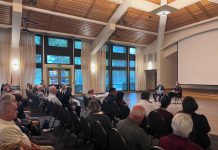By Marty Richman Santa Clara County prosecutors failed in their
duty earlier this month when they allowed Paul Greer, his sister
Rosemary Ball and husband, Michael Ball, to plead no contest to a
raft of felony charges in exchange for relatively light sentences
in their long-running car-towing scam case.
Santa Clara County prosecutors failed in their duty earlier this month when they allowed Paul Greer, his sister Rosemary Ball and husband, Michael Ball, to plead no contest to a raft of felony charges in exchange for relatively light sentences in their long-running car-towing scam case. Greer’s father, Vincent Cardinalli Sr., is the last remaining suspect in the case and still faces charges.
The three pleading family members were accused of involvement in a car-towing swindle that used the state’s powerful legal system as a weapon to bully and bludgeon hundreds of innocent victims into financial submission in several Northern California counties, including Santa Clara and San Benito. They often towed cars, sold them without properly notifying the owners, and then sued the unsuspecting victims for the towing charges and storage fees.
“They were basically running a lawsuit mill,” Deputy District Attorney Dale Lohman said. “It was a very complicated and elaborate fraud.”
Paul Greer, former owner of B&C Towing, pleaded no contest to 59 felony counts, including grand theft, perjury and embezzlement; he will be sentenced to only eight years in prison. His sister, Rosemary Ball, pled to obstruction of justice, attempted grand theft and perjury; she faces a short sentence of four to six months in jail. Her husband, Michael Ball, plead to attempted grand theft and faces no more than 150 days of electronic monitoring.
At the sentencing hearings in August, prosecutors must demand restitution for the victims and substantial fines including forfeiture of assets. The lack of a sizeable financial penalty would allow the criminals to retain their ill-gotten gains and it would fail to recoup the significant cost state and local jurisdictions incurred over the almost three years it took to conclude this portion of the case. Mere garnishment of their prison wages is not enough.
By accepting no contest pleas instead of insisting on guilty pleas, the prosecutors made it significantly more difficult for the victims to recover the money swindled from them. According to the Superior Court, a no contest plea means the defendant does not dispute the charge. This plea is the same as a guilty plea; however, the conviction cannot be used against the defendant in a civil lawsuit – that is critical.
The idea that hundreds of victims, many of limited means and/or familiarity with the legal system, are going to sue to recover damages is a pipe dream. Even if they did, the lack of guilty pleas will make it just that much harder to win civil cases. Lawsuits are the battleground these swindlers used for their scams, they know the system well – it’s the victims who need help in obtaining justice.
Then there is the nature of the crime. Using the courts as an unwitting accomplice and enforcer is a special case because it damages the public’s confidence in the judicial system. While the prosecutors and courts have traditionally looked upon economic crime as less of a threat to society than violent crime, actions that undermine the entire system are especially dangerous; they attack the bedrock we rely on for a civil society. This crime cries out for punishments that reflect the cold and calculated damage done to the system as well as the victims. The terms of those plea agreements do not rise to that level.
Finally, the courts must do a self-evaluation and add safeguards to detect and prevent these abuses in the future. How was it that the malicious litigants continued to operate when so many victims testified and, on occasion presented evidence, that something was terribly wrong? Perhaps the judges in small claims court were suffering from excuse fatigue – if they ever needed a reason to improve their internal review process, this is it.
Marty Richman is a Hollister resident who pens a weekly column for the Free Lance.







